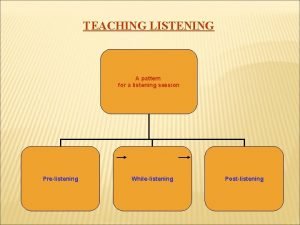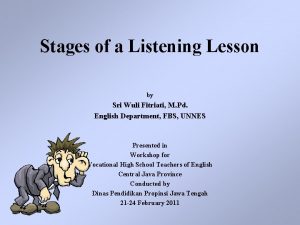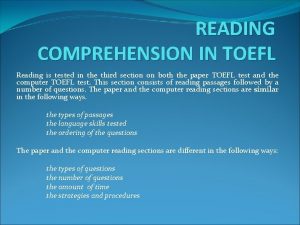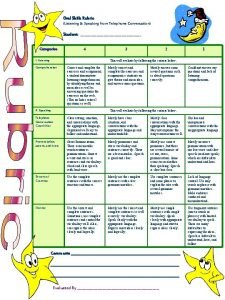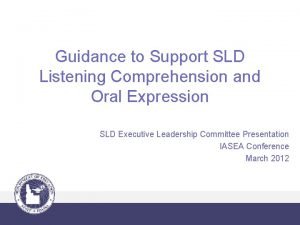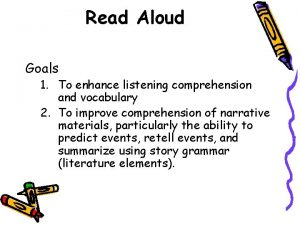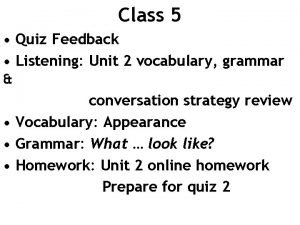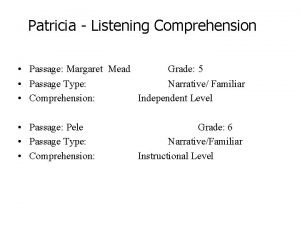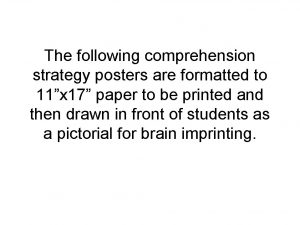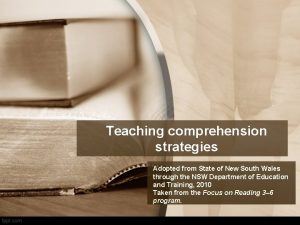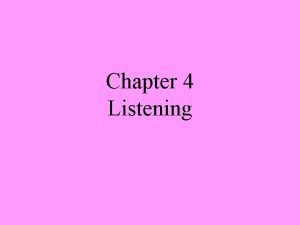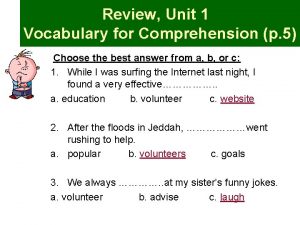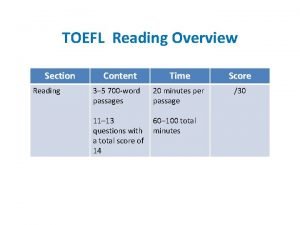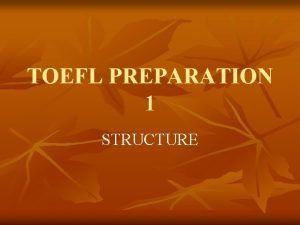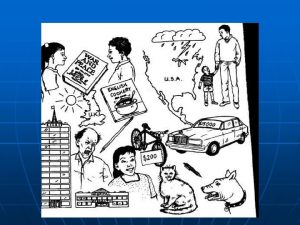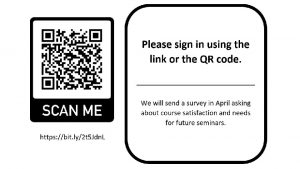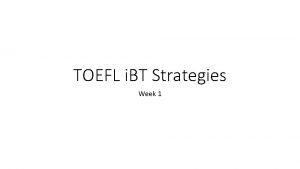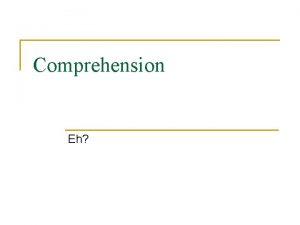TOEFL PREPARATION 2 REVIEW LISTENING COMPREHENSION GENERAL STRATEGIES









































- Slides: 41

TOEFL PREPARATION 2 REVIEW LISTENING COMPREHENSION

GENERAL STRATEGIES l l l Be familiar with the directions. Listen carefully to the conversations and talks. Know where the easier and more difficult questions are generally found. Never leave any questions blank on your answer sheet. Use any remaining time to look ahead at the answers to the questions that follow.

THE LISTENING PART A QUESTIONS STRATEGIES FOR THE LISTENING PART A QUESTIONS § As you listen to each short conversation, focus on the second line of the conversation. § Keep in mind that the correct answer is probably a restatement of a key word or idea in the second line of the conversation. § Keep in mind that certain structures and expressions are tested regularly in Listening part A. § Keep in mind that these questions generally progress from easy to difficult. § Read the answers and choose the best answer to each question. Remember to answer each question even if you are not sure of the correct response. § Even if you do not understand the complete conversation, you can find the correct answer. § Never choose an answer because it sounds like what you heard in the conversation.

SKILL 1: RESTATEMENT l Example l 1. On the recording, you hear: l (woman) Steve, is something the matter? You don’t look very good. l (man) Oh, I’m feeling a little sick today. l (narrator) What does the man mean? l In your test book, you read: l (A) He’s not very good-looking. l (B) He’s a bit ill. l (C) He looks worse than he feels. l (D) His feet are a little thick.

2. (woman) : I can’t wait until finals are over. (man) : Have you been studying much for your finals? (woman) : I’ve been studying so much that I can’t fit anything more in my brain. (narrator) : What does the woman mean? (A) She can’t feel any pain. (B) The feat has drained her. (C) She has prepared considerably. (D) It’s finally plain that she can’t ignore it.

CHOOSE ANSWERS WITH RESTATEMENTS o As you listen to the second line of the conversation, you should focus on the key idea(s) in that line. o If you see a restatement of the key idea(s) in a particular answer, then you have probably found the correct answer. o Do not choose answers with words that sound similar to the words on the recording.

SKILL 2: NEGATIVES l l l Example 3. On the recording, you hear: (woman) Did you get a lot of work done at the library today? (man) I couldn’t. It wasn’t very quiet there. (narrator) What does the man mean? In your test book, you read: (A) The library was noisy. (B) He got a lot done. (C) He couldn’t quite get to the library today. (D) The library’s a good place to work because it’s quiet

4. (man) : What kinds of questions do you think will be on the exam? (woman) : I’ve heard that this professor gives lots of long essay questions. (man) : If there a lot of essay questions, then I’m not going to have an easy time of it. (narrator) : What does the man say about the exam? (A) It’s probably going to be hard for him. (B) It won’t have a lot of essays. (C) He’s not going to take it. (D) He doesn’t have any questions about it.

NEGATIVE SENTENCES l Tom is not sad l Tom is happy about the results. l The door isn’t l The door is closed. open. l Steve failed the class. l Steve did not pass the class.

SKILL 3: SUGGESTIONS l l l 5. Example On the recording, you hear: (man) I haven’t talked with my parents in a while. (woman) Why don’t you call them now? (narrator) What does the woman suggest? In your test book, you read: (A) Calling off his visit. (B) Talking about his parents. (C) Calling his parents in a while. (D) Phoning his family.

6. (woman)I’m going to change my major. This major is too hard for me. (man) It’s common to feel this way when you start out. Why don’t you wait a little while and see how things go before you make such a big decision? (narrator) What does the man suggest? (A) Waiting until a decision has been made (B) Changing her major to something easier (C) Putting off the decision (D) Starting over again

7. (woman) Do you have any suggestions on this project for biology class? (man) I do, but I have a lecture in five minutes. Let’s talk about the project over lunch. (narrator) What does the man mean? (A) He has to attend a five-minute lecture. (B) They can discuss their ideas while they eat. (C) He will discuss the project after lunch. (D) They can attend the lecture together.

EXPRESSIONS OF SUGGESTION l. Why…not…? l. Why not…? l. Let’s…

SKILL 4: PASSIVES Example 8. On the recording, you hear: (man) Is that a new chair? (woman) Yes, we just bought it last week. (narrator) What does the woman mean? In your test book, you read: (A) She brought the chair with her. (B) The chair was lost for a week. (C) The chair was purchased recently.

PASSIVE STATEMENTS o If the conversation contains a passive statement, the answer to the question is often an active statement. o If the conversation contains an active statement, the answer to the question is often a passive statement.

SKILL 5: WHO AND WHERE Example 9. On the recording, you hear: (man) What do you do during your performances? (woman) I play the piano and sing. (narrator) Who is the woman most likely to be? In your test book, you read: (A) An athlete. (B) A member of the audience. (C) A clerk in a music store. (D) A musician.

10. Man What do you think I should be doing to improve my finances? Woman You definitely need to put a higher percentage of your salary into a savings account and it would also be a good idea to invest more in a retirement fund. Who is the woman most likely to be? (A) A cashier (B) A receptionist (C) A financial advisor (D) A business professor

11. Woman I haven’t been able to do the supplementary readings because the articles on reserve are always checked out. Man Thanks for letting me know. I’ll ask the librarian to put some more copies on reserve. That should help. Who is the man most likely to be? (A) A librarian (B) A professor (C)A bookstore clerk (D)A student

12. Man Woman Narrator I can’t understand why Arthur dropped his chemistry class. He was doing so well in it. Well, me neither, but he must have a good reason. What does the woman mean? (A) She thinks Arthur wasn’t doing well in the class. (B) She’s not sure why Arthur dropped the class either. (C) She believes Arthur dropped the class for no reason. (D) She decided to drop the class too.

Man Doctor Brighton’s biology quizzes are short and tricky. Woman Aren’t they, though! Narrator What does the woman mean? (A) She agrees with the man. (B) She thinks the quizzes are too short. (C) She doesn’t like biology. (D) She thinks the quizzes aren’t tricky.

SKILL 6 EXPRESSIONS OF AGREEMENT l So do I. l I’ll say. l Isn’t he/ she/ it though! (Didn’t he/ Wasn’t she/ Hasn’t it though!) l Me, too. l You can say that again. l I couldn’t agree with you more. l You bet! l Who wouldn’t? l Neither do I. l I don’t either.

THE LISTENING PART B QUESTIONS The conversations are often about Ø some aspect of school (how difficult a class is, how to write a research paper; how to register for a course) Ø General living (renting an apartment, playing sports, going to the bank) Ø Topics currently in the news in the United States (desalination of the water supply, recycling of used products, damage from a storm or some other type of natural phenomenon).

STRATEGIES FOR THE LISTENING PART B QUESTIONS l If you have the time, preview the answers to the Listening Part B questions. l Listen carefully to the first line of the conversation. l As you listen to the conversation, follow along with the answers in your test book, and try to determine the correct answers. l You should guess even if you are not sure.

SKILL 7: THE QUESTIONS Example In your test book, you read: (A) On Monday. (B) Next week. (C) Tomorrow. (D) After class. You try to anticipate the question: When will something happen?

SKILL 8: THE TOPIC Example: On the recording, you hear: (narrator) Listen to the conversation between two students. (man) What did you think of that history exam? (woman) That was the hardest exam I’ve ever seen. (man) And it wasn’t just hard! It was long, too. You think: The topic of conversation is a very and difficult history exam.

SKILL 9: THE ORDER OF THE ANSWERS Example On the recording you hear (narrator): Questions 1 and 2. Listen to two students on a university campus. Can you help me? I’m lost. Sure. Where are you trying to go? I have a class in Stanfield Hall at 3: 00. I thought I knew where I was going, but I guess I was wrong. You certainly are lost. Stanfield Hall is on the other side of the university. I’m heading in that direction. Come on with me and I’ll show you the way. Thanks. You’re a lifesaver.

On the recording, you hear (narrator) 14. What problem does the man have? 15. Where is Stanfield Hall? In your test book, you read (same time): 14. A. He’s sick. B. He’s lost. C. He’s tired. D. He’s broke. 15. A. Directly in front of them. B. To the left. C. Quite nearby. D. On the other side of campus.

SKILL 10: THE QUESTIONS Example In your test book, you read: (A) For a week. (B) Since yesterday. (C) For two days. (D) Since 10: 00 this morning. You try to anticipate the question: How long has (something) been going on?

SKILL 11: THE TOPIC Example On the recording, you hear: (narrator) Listen to a talk at the start of a meeting. (woman) I’d like to call this meeting to order now. This is the third monthly meeting of the science club this semester, and today we need to discuss the upcoming science fair. You think: The topic of the talk is a meeting of the science club to discuss the science fair.

THE LISTENING PART C QUESTIONS STRATEGIES FOR THE LISTENING PART C QUESTIONS l If you have time, preview the answers to the Listening Part C questions. l Listen carefully to the first line of the talk. l As you listen to the talk, follow along with the answers in your test book and try to determine the correct answers.

THE LISTENING PART C QUESTIONS STRATEGIES FOR THE LISTENING PART C QUESTIONS l You should guess even if you are not sure. l Use any remaining time to look ahead at the answers to the questions that follow.

PART C LONG TALK l Three talks, each followed by a number of multiple-choice questions, appear in Part C of the Listening Comprehension section of the paper TOEFL test. You will hear the talks and the questions on a recording; they are not written in your test book. You must choose the l best answer to each question from the four choices that are written in your test book.

l Like the conversations in Part B, the talks are often about some aspect of school life or topics currently in the news. It is also very common for the talks to be shortened versions of lectures from courses taught in American colleges and universities.

l On the recording, you hear: l (narrator) Questions 1 through 4. Listen to a talk about the settlement l Of America. l (woman) The settling of the vast farmlands in central North America l was delayed at least partly because ofan error by one man. l In the early nineteenth century, Lieutenant Zebulon Pike of the U. S. Army was sent out to explore and chart the huge

l expanses of land in the center of the continent. When he returned from his explorations, he wrote a report in which he l erroneously stated that the vast plains in the central part of the continent were desert like, comparable to the Sahara in l Africa. In reality, however, these vast plains contained some of the most fertile farmland in the world.

l Because of Pikes mistake, the maps of the day depicted the central part of what l is today the United States as a vast desert rather than the excellent and available farmland that it was. This mistaken l Belief about the nature of those lands caused settlers to avoid the central plains for years.

QUESTION l On the recording, you hear: l 16. (narrator) What is the topic of this talk ? l In your test book, you read: l (A) Zebulon Pike's career l (B) A mistake that influenced the l settlement of America l (C) A report for the army l (D) The farmlands

l On the recording, you hear: l 17. (narrator) How did Pike describe the area that he explored? l In your test book, you read: l (A) As a desert l (B) As usable for army purposes l (C) As located in the Sahara l (D) As available for farmland

l On the recording, you hear: l (narrator) What was this area really like? l 18. In your test book, you read: l (A) It was a vast desert. l (B) It was covered with farms. l (C) It was excellent farmland. l (D) It was similar to the Sahara.

l On the recording, you hear: l 19. (narrator) This talk would probably be given in which of the following courses ? l In your test book, you read: l (A) Agricultural Science l (B) American History l (C) Geology of the United States l (D) Military Science

l REFERENCES l Blog/stikom. edu/ristanti/file 2011/10/TOEFL v. Deborah Philips (2001) Complete Course for the TOEFL Test. Preparation for Computer and paper test. Longman
 Post listening stage
Post listening stage Pre listening while listening post listening activities
Pre listening while listening post listening activities Until 1996 the sears tower
Until 1996 the sears tower Listening section toefl
Listening section toefl Toefl reading strategies
Toefl reading strategies Listening about natural disasters
Listening about natural disasters Listening comprehension assessment
Listening comprehension assessment Listening and speaking rubric
Listening and speaking rubric Sld listening comprehension
Sld listening comprehension Listening comprehension goals
Listening comprehension goals Unit 2 quiz: listening comprehension
Unit 2 quiz: listening comprehension Section 1: listening comprehension
Section 1: listening comprehension Social media listening comprehension
Social media listening comprehension Let's practice listening comprehension
Let's practice listening comprehension Unit 15 quiz listening comprehension
Unit 15 quiz listening comprehension Grade 5 listening comprehension
Grade 5 listening comprehension 7 comprehension strategies
7 comprehension strategies Comprehension strategy posters
Comprehension strategy posters Super six
Super six Drta reading strategy
Drta reading strategy Super six comprehension strategies nsw det
Super six comprehension strategies nsw det Active listening passive listening
Active listening passive listening What is critical listening
What is critical listening Post listening activities
Post listening activities Active listening vs hearing
Active listening vs hearing Top down bottom up listening activities
Top down bottom up listening activities Paper 2 aice general paper
Paper 2 aice general paper General assembly comprehension check
General assembly comprehension check Review unit 1 vocabulary
Review unit 1 vocabulary Toefl junior speaking picture narration
Toefl junior speaking picture narration Toefl reading time
Toefl reading time Parent flamingos lose their intense pink coloring until …
Parent flamingos lose their intense pink coloring until … Toefl practice online (tpo)
Toefl practice online (tpo) 8 sentence patterns
8 sentence patterns Toef test
Toef test Toefl itp level 1 and 2 difference
Toefl itp level 1 and 2 difference 青谷正妥
青谷正妥 Light can travels from the sun toefl
Light can travels from the sun toefl Cefr levels toefl
Cefr levels toefl Compare and contrast conclusion example
Compare and contrast conclusion example Skill 6: listen for who and what with multiple nouns
Skill 6: listen for who and what with multiple nouns Toefl ibt reading section
Toefl ibt reading section
